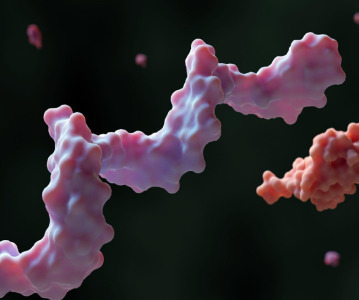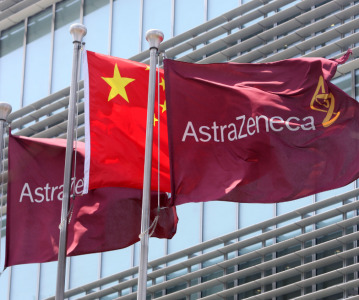Study identifies potential new pathway for drug development
A newly found understanding of receptor signaling may have revealed a better way to design drugs.
A newly found understanding of receptor signaling may have revealed a better way to design drugs. A study from Nationwide Children's Hospital suggests that a newly identified group of proteins, alpha arrestins, may play a role in cell signaling that is crucial to new drug development. The study appears in PLOS ONE.
More than one-third of drugs on the market work by targeting G protein-coupled receptors that control how cells communicate and function. With many hundreds of members, G protein-coupled receptors are the largest family of signaling receptors throughout the body.
Once a cell's G protein-coupled receptor binds with a natural ligand or a drug, intracellular G proteins and beta arrestins independently mediate various signals. Immediately following, beta arrestins block further signaling of G proteins and recruit proteins to remove the receptor to halt cell signaling. Those receptors can subsequently recycle to the cell surface or be destroyed.
"Receptor down regulation caused by beta arrestins can interfere with drug efficacy because the G protein-coupled receptor that the drug has been targeting is absent from the cell surface," said Carlos E. Alvarez, PhD, principal investigator in the Center for Molecular and Human Genetics at The Research Institute at Nationwide Children's Hospital and lead study author. "This is why patients who are prescribed long-term medication can become drug-tolerant and require higher and higher doses."
In some cases, a drug's ability to trigger beta arrestin effects and block G protein signaling is preferential. Take beta blockers, for example. As the name suggests, beta blockers interfere with the binding to the receptor for epinephrine and other stress hormones, weakening the hormones' effects and therefore being useful in treating irregular heartbeats, prevention of second heart attacks, hypertension and other conditions. Screening has revealed that the beta blocker Carvedilol may be the most ideal for treatment of heart conditions as it reduces the cardiotoxic effects of G protein signaling, while increasing the cardioprotective effects of beta arrestin signaling.
Yet, it seems that beta arrestins may only be part of the cell signaling story. In 2008, Dr. Alvarez discovered a subfamily of arrestins that his team named alpha arrestins. In the current study, Fortune Shea in Dr. Alvarez's lab used biochemical and imaging approaches to further identify the role alpha arrestins play in cell signaling.
He found that alpha arrestins respond to receptor binding and recruit enzymes that chemically modify the receptor to initiate aspects of down regulation. These effects occur in the first five minutes after the receptor is bound, the same time frame that beta arrestins are known to have roles in triggering down regulation. The team is also the first to find that alpha arrestins function coordinately with beta arrestins.
"Our findings suggest that alpha arrestins, like beta arrestins, are ubiquitous regulators of G-protein coupled receptor signaling," says Dr. Alvarez. "It seems that like beta arrestins, alpha arrestins could have great pharmacological relevance."
A major effort in pharmacology is to develop drugs with functional selectivity that either target G protein or beta arrestin signaling effects. Dr. Alvarez foresees alpha arrestins becoming a big player in the refining of such efforts.
"Just as has been discovered with beta blockers and beta arrestin, I expect we'll find drugs that also have significant alpha arrestin effects," he says. "I believe that targeting alpha arrestins will allow us to develop compounds that are more effective and have reduced side effects," says Dr. Alvarez.
Shea F, Rowell J, Li Y, Chang TH, Alvarez C. Mammalian alpha arrestins link activated seven transmembrane receptors to Nedd4 family E3 ubiquitin ligases and interact with beta arrestins. PLOS ONE.
Related News
-
News Google-backed start-up raises US$600 million to support AI drug discovery and design
London-based Isomorphic Labs, an AI-driven drug design and development start-up backed by Google’s AI research lab DeepMind, has raised US$600 million in its first external funding round by Thrive Capital. The funding will provide further power t... -
News AstraZeneca to invest US$2.5 billion in Beijing R&D centre
Amid investigations of former AstraZeneca China head Leon Wang in 2024, AstraZeneca have outlined plans to establish its sixth global strategic R&D centre in China. Their aim is to further advance life sciences in China with major research and manufact... -
News Experimental drug for managing aortic valve stenosis shows promise
The new small molecule drug ataciguat is garnering attention for its potential to manage aortic valve stenosis, which may prevent the need for surgery and significantly improve patient experience. -
News How GLP-1 agonists are reshaping drug delivery innovations
GLP-1 agonist drug products like Ozempic, Wegovy, and Mounjaro have taken the healthcare industry by storm in recent years. Originally conceived as treatment for Type 2 diabetes, the weight-loss effects of these products have taken on unprecedented int... -
News A Day in the Life of a Start-Up Founder and CEO
At CPHI we work to support Start-Up companies in the pharmaceutical industry and recognise the expertise and innovative angles they bring to the field. Through our Start-Up Programme we have gotten to know some of these leaders, and in this Day in the ... -
News Biopharmaceutical manufacturing boost part of new UK government budget
In their national budget announced by the UK Labour Party, biopharmaceutical production and manufacturing are set to receive a significant boost in capital grants through the Life Sciences Innovative Manufacturing Fund (LSIMF). -
News CPHI Podcast Series: The power of proteins in antibody drug development
In the latest episode of the CPHI Podcast Series, Lucy Chard is joined by Thomas Cornell from Abzena to discuss protein engineering for drug design and development. -
News Amgen sues Samsung biologics unit over biosimilar for bone disease
Samsung Bioepis, the biologics unit of Samsung, has been issued a lawsuit brought forth by Amgen over proposed biosimilars of Amgen’s bone drugs Prolia and Xgeva.
Recently Visited
Position your company at the heart of the global Pharma industry with a CPHI Online membership
-
Your products and solutions visible to thousands of visitors within the largest Pharma marketplace
-
Generate high-quality, engaged leads for your business, all year round
-
Promote your business as the industry’s thought-leader by hosting your reports, brochures and videos within your profile
-
Your company’s profile boosted at all participating CPHI events
-
An easy-to-use platform with a detailed dashboard showing your leads and performance







.png)